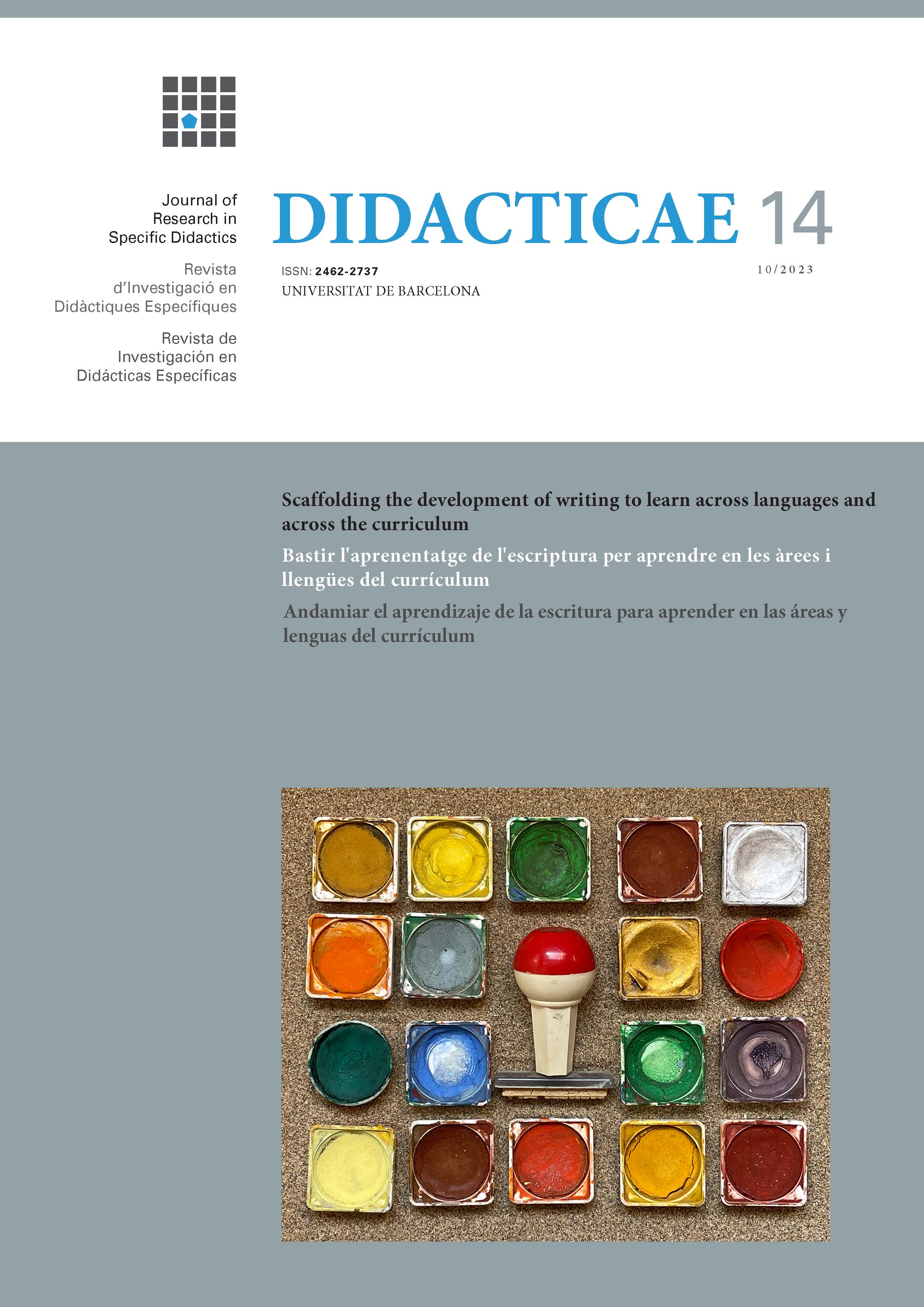Reading to Learn: Powerful pedagogy for disciplinary teaching in a high-stakes examination curriculum
Llegir per Aprendre: Pedagogia útil per a l’ensenyament de disciplines en currículums amb exàmens estandaritzats
DOI:
https://doi.org/10.1344/did.2023.14.30-53Paraules clau:
Llegir per Aprendre, pedagogia del gènere, escriptura i lectura disciplinar, lingüística sistèmico-funcional, formació docentResum
Aquest treball de caire qualitatiu es proposa presentar els canvis produïts en la manera de planificar i interactuar a l’aula d’una professora d’història d’educació secundària al Regne Unit, després d’haver rebut una formació en didàctica de l’escriptura basada en gèneres, més concretament, el model Reading to Learn (Llegir per Aprendre), basat en la Lingüística Sistèmico-Funcional. En el marc del curs preparatori per obtenir el Certificat General d’Educació Secundària, la formació incloïa l’anàlisi del llenguatge i dels gèneres textuals específics de la matèria, així com el coneixement d’estratègies de suport a la lectura i a l’escriptura per abordar la planificació docent. L’estudi de les pràctiques i de la interacció a l’aula mostren que la professora fou capaç d’abordar els textos de la seva disciplina a través de la lent del gènere discursiu, identificant així la bretxa present entre els gèneres dels llibres de text (informatius) i els gèneres escrits requerits als exàmens (valoratius). A més, la planificació d’estratègies de suport a la lectura i a les anotacions sobre el text van incidir positivament en la construcció conjunta a l’aula del gènere textual demanat.
Referències
Acevedo, C., Rose, D. & Whittaker, R. (Eds.) (2023). Reading to Learn, reading the world. Equinox Publishing.
Acevedo, M. C. (2020). Bringing language to consciousness: Teacher professional learning in genre-based reading pedagogy. [PhD thesis, The Open University] https://doi.org/10.21954/ou.ro.00011316
Blanco Fernández, J. M., & Moyano, E. I. (2021). Propuestas de enseñanza de la lectura y la escritura con base en la Lingüística Sistémico-Funcional: contextos anglófono e hispanohablante. D.E.L.T.A., 37(3), 1-32. http://dx.doi.org/10.1590/1678-460X202152956
Bullock Report (1975). A language for life. DES. HMSO.
Coffin, C. (2006). Historical discourse: The language of time, cause and evaluation. Continuum.
Cox Report (1989). English for ages 5-16. DES. HMSO.
Denzin, N. K., & Lincoln, Y. S. (2000). The discipline and practice of qualitative research. In N.K. Denzin & Y.S. Lincoln (Eds.), Handbook of qualitative research (2nd ed., pp. 1-28). Thousand Oaks, Sage.
DfE (2012). Teachers’ Standards (DFE-00066-2011). https://www.gov.uk/government/uploads/system/uploads/attachment_data/file/301107/Teachers__Standards.pdf
Dreyfus, S., Macnaught, L., & Humphrey, S. (2011). Understanding joint construction in the tertiary context. Linguistics and
Human Sciences, 4(2), 135-160. http://dx.doi.org/10.1558/lhs.v4i2.135
Freebody, P. (2003). Qualitative research in education: Interaction and practice. Sage Publications.
Husbands, C., & Pearce, J. (2012). What makes great pedagogy? Nine claims from research, National college for School Leadership. https://assets.publishing.service.gov.uk/
Kingman Report (1988). Report of the Committee of Inquiry into the Teaching of English Language. DES. HMSO.
Leahy, S., Lyon, C., Thompson, M., & Wiliam, D. (2005). Classroom assessment: Minute by minute, day by day. Educational Leadership, 63(3), 18-24.
Martin, J. R., & Rose, D. (2008). Genre relations: Mapping culture. Equinox Publishing.
Navarro, F. (2019). Aportes para una didáctica de la escritura académica basada en géneros discursivos. D.E.L.T.A., 35(2), 1-32. http://dx.doi.org/10.1590/1678-460X2019350201
Newbolt Report (1921). The teaching of English in England. Board of Education, HMSO.
Ofsted (2013). Improving literacy in secondary schools: A shared responsibility. www.ofsted.gov.uk/resources/120363
Rose, D. (2011). Genre in the Sydney School. In J. Gee & M. Handford (Eds.), The Routledge handbook of discourse analysis (pp. 209-225). Routledge.
Rose, D., & Acevedo, C. (2006). Closing the gap and accelerating learning in the Middle Years of Schooling. Australian Journal of Language and Literacy, 14(2), 32-45.
Rose, D. (2014). Reading to Learn: Accelerating learning and closing the gap (2014 Edition). Reading to Learn. http://www.readingtolearn.com.au
Rose, D., & Martin, J. R. (2012). Learning to write, reading to learn: Genre, knowledge and pedagogy in the ‘Sydney School’. Equinox Publishing.
Rothery, J. (1994). Exploring literacy in school - English (Write it Right resources for literacy and learning). Metropolitan East Disadvantaged Schools Program.
Sampson, G. (1922). English for the English. Cambridge University Press.
Timperley, H., Wilson, A., Barrar, H., & Fung, I. (2007). Teacher professional learning and development, best evidence synthesis iteration (BES). Wellington, New Zealand Ministry of Education.
WJEC (2013). GCSE Teachers’ guide, history: Teachers’ guide to the Strengthened Examined Units 1, 2 and 3. https://www.wjec.co.uk/qualifications/history/history-gcse/19238.pdf?language_id=1
Wilhelm, J. D., Baker, T. N., & Dube, J. (2001). Strategic reading: Guiding students to lifelong literacy 6-12. Boynton/Cook.
Wright, J., Waugh, S., & Evans, P (Eds.). (2010). The USA 1910-1929 & Germany 1929-1947. Hodder Education.
Descàrregues
Publicades
Número
Secció
Llicència
Drets d'autor (c) 2023 Claire Acevedo

Aquesta obra està sota una llicència internacional Creative Commons Reconeixement-CompartirIgual 4.0.
Els autors que publiquin en aquesta revista estan d'acord amb les següents condicions:
- Els autors conserven els drets d'autoria i otorguen a la revista el dret de primera publicació de l'obra.
- Els textos publicats a Didacticae estan sota una llicència de Reconeixement - Compartir igual 4.0 Espanya de Creative Commons.
- Per poder esmentar els treballs s'ha de citar la font (Didacticae) i l'autor del text.
- Didacticae no accepta cap responsabilitat pels punts de vista i les declaracions fetes pels autors en els seus treballs.



